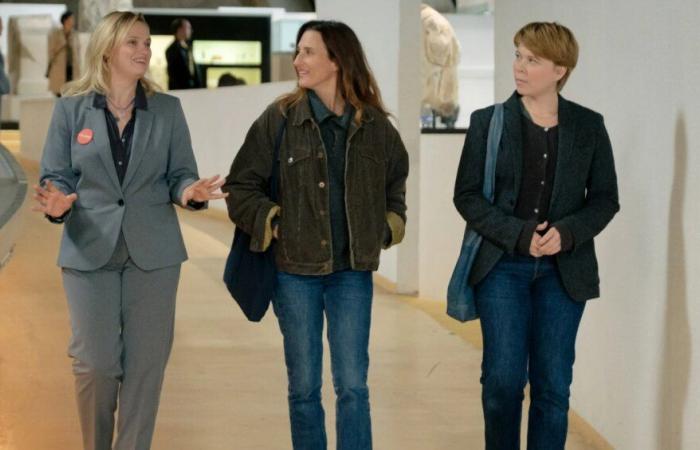In 1999, Emmanuel Mouret opened his graduation film, So walk around naked!by a mischievous voice-over: misleadingly presenting places and characters in the story to come, the latter enjoyed thwarting the viewer's expectations by constantly postponing the start of its story. More than the cinema of Rohmer (with which he has often been associated), it is that of Sacha Guitry, notably A Cheater's Novelfrom which he then seemed to be inspired by his way of subordinating the image to the voice of an omnipotent storyteller. Twenty-five years later, the same device resurfaces at the beginning of Three friends : the city has changed (Marseille has given way to Lyon), but the narrator's voice still enjoys delaying the entry into the story by listing the different places where the latter will take place. If Mouret therefore seems to be returning to a discreet demiurgism – he who had in the past made his dual role as actor-director the center of his cinema –, Three friends yet pushes to an unprecedented point a contrary inflection which has taken place throughout his career. Never has the filmmaker so clearly depicted the position of withdrawal that he has adopted since he devoted himself exclusively to directing: the voice-over is in fact no longer his, but that of Vincent Macaigne, who plays Victor, a secondary character in the plot, who disappears after only thirty minutes of film. Based on his ghostly point of view, the first part is a retrospective story told from beyond the grave, where the staging adopts the spectral distance of the character to film his entourage, in particular Joan, his companion (India Hair), and her two best friends, Rebecca (Sara Forestier) and Alice (Camille Cottin).
From the opening of the film, close-ups of Joan tend to transform her into an icon, a way for the filmmaker to play on her religious surname (Joan of Arc), but also to restore the loving point of view that Victor has on her ( “ Look how beautiful she is » he said, when introducing it). The sacredness of the character is then reflected by the greatness of her intentions (she feels guilty for no longer loving her companion), then by a certain emotional withholding, notably when she begins to refuse the advances of Thomas (Damien Bonnard), neighbor of level and French colleague in the high school where she teaches. Her inadequacy to the world, underlined during a dialogue where she presents her vision of love (considered only from the angle of fatality), then shines through during her domestic scenes with Victor, whose signs of affection are experienced like oppression. Overframing, false split-screensblocked perspectives: the virtuosity of the sequence shot adapts here to the vagaries of its emotions, as if the camera was pursuing the characters in order to restore, behind their unsaid and their silences, ” the happy complexity » of everyone’s feelings.
Dissonances and counterpoints
Intertwined with Joan's painful story, the crossed stories of Alice and Rebecca's hearts, secretly linked by the same man, allow Mouret to reconnect with the vein of his moral tales. Husband of one and lover of the other, Éric (Grégoire Ludig) embodies a new avatar of clumsy seducer such as the director has often interpreted them, in whom adultery paradoxically becomes the condition for becoming faithful to the person he we love it. But contrary to the hedonism advocated by his first comedies, Three friends focuses above all on restoring the illusions in which the characters are lulled, the filmmaker having fun confronting them with the traps of destiny. On the one hand, Alice is satisfied with her passionless marriage until she enters into an extramarital affair with a man whose telephone number she dreamed of. On the other hand, Rebecca imagines herself experiencing romantic adventures with her lover, while the latter gradually abandons her. In each case, the irruption of doubt takes the form of a break in the continuity of the dialogue, whether it is a sudden forward tracking shot or a 180° pan, these effects then seizing up the ” little music” of Mourettian marivaudage, whose apparent inconsistency nevertheless conceals its share of dissonances. This is the case during the most beautiful scene in the film, during which Joan and Victor say goodbye: under a small stone arch overlooking a wood, Victor gives his partner one last chance, before a gust of wind unexpected come to widen for good the breach that has opened between them. The setting here ceases to be a simple backdrop against which the exchanges of the protagonists stand out; the latter are an integral part of an “environment” where the surrounding world seems to enter into dialogue with their affects.
It is in this light that we must read the rather unexpected irruption of the supernatural in the film. Returning among the living for a discussion with Joan, the specter of Victor opens a new dimension inside this small theater of feelings: that of silence and absence. The shot-reverse shot now represents the irremediable distance that separates the couple, while creating a gap allowing the characters to sincerely express their emotions, particularly when Joan finally reveals to Victor how much she loved him. The singularity of the film also relies heavily on this character determined to chart his own path within the story, without ever falling into the side of romantic comedy or melodrama. We will have to wait until the last third to see the heroine finally succumb to the fire of passion, in a scene which also resembles a new beginning. In an empty apartment with bare walls, the young woman begins a relationship with Martin, Thomas's best friend. If Mouret's settings often contain their share of clues, revealing the secret thoughts of the characters, here the shot had to be completely emptied, like a blank page on which the silhouette of the heroine is inscribed, so that the latter finally invests the space and becomes the actress of her own life. This is also underlined by a beautiful tracking shot at the end of the sequence, revealing that the young woman, hidden behind a section of immaculate wall, completes her mourning by deciding to take the first step – she then tenderly kisses her lover of one evening, without fear of the next day.






